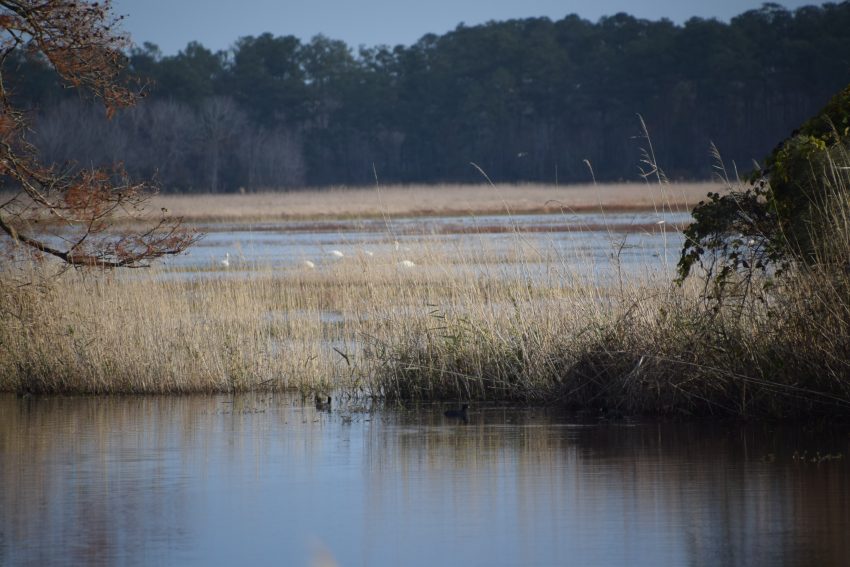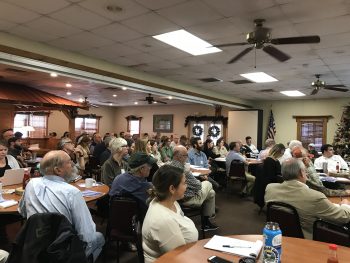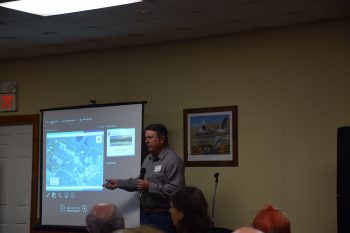
Photo by Jennifer Allen
Final draft submitted to N.C. Division of Water Resources following public symposium
The final draft of the Lake Mattamuskeet Watershed Restoration Plan was presented to an audience of nearly 100 during a public symposium that was held at Martelle’s “Feed House” Restaurant in Engelhard on Dec. 3. The final draft and presentations from the symposium are available here.
Bill Rich, economic development consultant for Hyde County, welcomed guests and Erin Fleckenstein, coastal scientist and manager of the northeast regional office for the North Carolina Coastal Federation, reviewed the plan development process that occurred over the past 18 months. Michael Flynn, coastal advocate for the federation, provided an overview of the management actions that have been prioritized by the core stakeholder team. Three moderated panel discussions served as an opportunity for the audience to learn more about water quality concerns and solutions, active water management and plan implementation.
Water Quality Concerns and Solutions

Attendees during panel discussion
Wendy Stanton, U.S. FWS biologist for the Mattamuskeet National Wildlife Refuge, provided an overview of the water quality monitoring efforts that take place within the lake and reviewed the results and trends including the loss of submerged aquatic vegetation (SAV).
April Lamb, graduate student at North Carolina State University, discussed an ongoing research project she is conducting to assess the feasibility of common carp exclusion and targeted SAV restoration within the lake.
Dr. Randall Etheridge, professor at East Carolina University, summarized an ongoing study he is conducting to evaluate the difference in water quality exported from impoundments that use different types of management strategies such as drawdown techniques, outflow control mechanisms and types of vegetation grown within the impoundments.
Allie Mulligan, resource specialist for the Hyde County Soil and Water Conservation District, reviewed the cost-share programs that are available to landowners to implement best management practices to improve water quality within the county.
Bill Edwards, biologist for the Natural Resources Conservation Service, highlighted Natural Resources Conservation Service specific conservation programs that landowners can participate in to improve water quality and water management as well as increase wildlife habitat.
Active Water Management

Wilson Daughtry reviewed the boundaries of the Mattamuskeet Drainage Association, which provides active water management on lands adjacent to the Lake Mattamuskeet watershed. Photo by Jennifer Allen
Dr. Randall Etheridge, professor at East Carolina University, conducted a bathymetric survey along the outlet canals and reviewed the results of the percent reduction in flow that occurs when present-day conditions are compared to the original design dimensions as a result of sedimentation and sea level rise.
Dr. Raymond Smith, professor at East Carolina University, developed a preliminary hydrologic model for Lake Mattamuskeet and discussed how the model can serve as a decision support tool to implement active water management within the watershed.
Daniel Brinn, water and flood control coordinator for Hyde County, provided an overview of the different types of administrative structures that are used within the county for drainage water management.
Wilson Daughtry and Joey Ben Williams shared their experiences managing the Mattamuskeet Drainage Association and the Fairfield Drainage District respectively.
Plan Implementation
The final panel discussion was composed of the three primary partners for the plan development and included: Bill Rich with Hyde County, Pete Campbell with U.S. Fish and Wildlife Service and Doug Howell with N.C. Wildlife Resources Commission. Each panelist discussed how the entity they represent will stay committed to the implementation of the plan.
The final draft was submitted to the N.C. Division of Water Resources for review on Dec. 7, 2018. A Division of Water Resources-approved watershed restoration plan is one of the funding eligibility requirements for the 319(h) grant program. Additional funding sources will also be pursued to implement priority management actions identified within the plan.
The federation will continue to maintain the project web page and e-mail subscription list to provide updates about the implementation of the watershed restoration plan.
Stay updated at nccoast.org/lakemattamuskeet.
